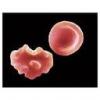Reputation Activity
-
 Liz0316 reacted to David Saikin in cord blood
Liz0316 reacted to David Saikin in cord blood
Have never used cord bloods in relation to transfusion (for decades). All reasons quoted above - ditto.
-
 Liz0316 reacted to SMW in cord blood
Liz0316 reacted to SMW in cord blood
Also did not use cord blood results for transfusion purposes. You can never be sure what is labeled as cord blood is actually cord blood and not maternal sample. Blood type differences may help but still better to have a standard practice. On the other hand, if you're transfusing only group O RBCs and AB plasma probably not as significant until sometime after 4 months when the patient is typed again and a different result is obtained.
Along the same lines, we also required a neonatal/heelstick sample in cases where the mother was Rh-neg and the cord blood sample tested the same ABO/Rh as mother as confirmation that RhIgG was not required. Did not see discrepancies that often however they did occur and one missed RhIgG prophylaxis resulting in immunization is enough to justify practice.
-
 Liz0316 reacted to Yanxia in cord blood
Liz0316 reacted to Yanxia in cord blood
I think there are two reasons we don't use cord specimen
1.the Wharton jelly in it will cause rouleux agglutination of cells
2.the antibodies came from the maternal circulation will be concentrated in the cord blood, the concentration is higher than in the maternal blood and neonate's blood circulation, will cause false positive.
-

-
 Liz0316 got a reaction from John C. Staley in transfusion reactions
Liz0316 got a reaction from John C. Staley in transfusion reactions
we put a sticker on the back of the unit with abbreviated instructions. Rarely do they read it. But, when they call, we instruct them to use a form and on the form is the time they notified the doctor, as well as vitals and other pertinent data.
(we also tell them to flip the unit over and read the sticker!)
Liz
-
 Liz0316 reacted to tbostock in Sunquest BB module
Liz0316 reacted to tbostock in Sunquest BB module
Yes, it can. You also have to retain SQ lab in the background and for all of the other functions that you use outside of the BB module. You'll need to interface your BB module through your Lab General new module though (if it's Beaker, it's not easy).
I know it may seem easier to keep what you have, but it may not in the long run.
-
 Liz0316 reacted to David Saikin in MLT vs MT
Liz0316 reacted to David Saikin in MLT vs MT
Dr Pepper has hit the nail on the head - the innate ability, initiative and interest of the worker. Regardless of education - these are qualities I look for in BB techs, whether MLTs or MTs. I've worked with SBBs who aren't worth a damn and the best BBer I ever worked with and learned A LOT from was an MLT.
I think there are other recent posts which address this topic somewhere on this site.
-
 Liz0316 got a reaction from kirkaw in Frequency of Antibody Workups--revisited
Liz0316 got a reaction from kirkaw in Frequency of Antibody Workups--revisited
Let's answer question # 2 first. In any given unit of donated blood, the red cells are of all ages, new and older. So, since the life span of the RBC in the circulation is approximately 90 days, "recently transfused" means that there is a possibility of donor red cells still in circulation in the patient - therefore, foreign antigens are present that could elicit an antibody response up to 90 days (approx.).
Question #1 - I think you were correct in requesting another antibody work up. Especially with the severe drop in Hgb. If a patient has been recently transfused - with in 3 months, the specimen is only good to work with for 4 days - the day it's drawn plus 3.
Assuming you don't do antibody work ups at your hospital, I believe this patient needed an additional work up at the reference lab.
The 3 month rule is because the body can form an antibody to a foreign antigen at any time that foreign (donated) red cells are actively in the patient's circulation.
I hope that helps, and I'm sure my reference lab colleagues will have more to say
Liz
-
 Liz0316 reacted to tbostock in Mini Panel/Screen for Patients Who Were Given Rhogam
Liz0316 reacted to tbostock in Mini Panel/Screen for Patients Who Were Given Rhogam
We also do the @ cells on the Ortho panel and do not do AHG crossmatches.
-
 Liz0316 reacted to CMCDCHI in Mini Panel/Screen for Patients Who Were Given Rhogam
Liz0316 reacted to CMCDCHI in Mini Panel/Screen for Patients Who Were Given Rhogam
We do a "short panel" (the @ on Ortho panels or [ ] on Immucor panels), call it passive anti-D probably from RhIG. We do not require AHG XM.
-
 Liz0316 got a reaction from goodchild in Frequency of Antibody Workups--revisited
Liz0316 got a reaction from goodchild in Frequency of Antibody Workups--revisited
Let's answer question # 2 first. In any given unit of donated blood, the red cells are of all ages, new and older. So, since the life span of the RBC in the circulation is approximately 90 days, "recently transfused" means that there is a possibility of donor red cells still in circulation in the patient - therefore, foreign antigens are present that could elicit an antibody response up to 90 days (approx.).
Question #1 - I think you were correct in requesting another antibody work up. Especially with the severe drop in Hgb. If a patient has been recently transfused - with in 3 months, the specimen is only good to work with for 4 days - the day it's drawn plus 3.
Assuming you don't do antibody work ups at your hospital, I believe this patient needed an additional work up at the reference lab.
The 3 month rule is because the body can form an antibody to a foreign antigen at any time that foreign (donated) red cells are actively in the patient's circulation.
I hope that helps, and I'm sure my reference lab colleagues will have more to say
Liz
-
 Liz0316 got a reaction from nisar10281 in RhD incompatible PLT transfusions
Liz0316 got a reaction from nisar10281 in RhD incompatible PLT transfusions
I have seen anti D developed from platelet transfusion, and recently. However, our policy is not to consider Rh unless the patient is a child (under 25) or a woman of child bearing years (under 50). We do not offer RhIg prophylaxis, unless the patient is a child or a woman under 50.
No difference between apheresis and pooled random and I don't consider Kell at all.
Liz
-
 Liz0316 got a reaction from carolyn swickard in What are your facilities procedures for indicating needing irradiated blood products?
Liz0316 got a reaction from carolyn swickard in What are your facilities procedures for indicating needing irradiated blood products?
The following is not pretty, but I finally got the indications to copy and paste. This is what we use for indications for irradiated products, which may be more than normal - however, we do have our own irradiator.
Questions - let me know.
Liz
7. IRRADIATED CELLULAR BLOOD COMPONENTS:
A. Accepted indications:
1. Immunocompromised marrow or organ transplant recipients.
2. Patients with hematologic disorders who will be undergoing allogeneic marrow transplantation imminently.
3. Intrauterine transfusions.
4. Neonatal exchange transfusions or use of extracorporeal membrane oxygenation (ECMO).
5. Neonates or pre-term infants.
6. Lymphoproliferative malignancies treated with Fludarabine.
7. Patients with Hodgkin’s disease.
8. Patients with congenital cell-mediated immunodeficiencies.
9. Recipients of directed donations from biologic relatives.
10. Recipients of donations from HLA-matched donors.
11. Recipients who are heterozygous at an HLA locus for which the donor is homozygous and shares an allele.
B. Possible indications:
1. Individuals getting immunosuppressive therapy, especially when susceptible to opportunistic infections.
2. Cancer patients who are immunosuppressed because of chemotherapy or radiation therapy.
3. Patients with AIDS who have opportunistic infections.
-
 Liz0316 got a reaction from Yanxia in Frequency of Antibody Workups--revisited
Liz0316 got a reaction from Yanxia in Frequency of Antibody Workups--revisited
Let's answer question # 2 first. In any given unit of donated blood, the red cells are of all ages, new and older. So, since the life span of the RBC in the circulation is approximately 90 days, "recently transfused" means that there is a possibility of donor red cells still in circulation in the patient - therefore, foreign antigens are present that could elicit an antibody response up to 90 days (approx.).
Question #1 - I think you were correct in requesting another antibody work up. Especially with the severe drop in Hgb. If a patient has been recently transfused - with in 3 months, the specimen is only good to work with for 4 days - the day it's drawn plus 3.
Assuming you don't do antibody work ups at your hospital, I believe this patient needed an additional work up at the reference lab.
The 3 month rule is because the body can form an antibody to a foreign antigen at any time that foreign (donated) red cells are actively in the patient's circulation.
I hope that helps, and I'm sure my reference lab colleagues will have more to say
Liz
-
 Liz0316 got a reaction from Yanxia in What are your facilities procedures for indicating needing irradiated blood products?
Liz0316 got a reaction from Yanxia in What are your facilities procedures for indicating needing irradiated blood products?
The following is not pretty, but I finally got the indications to copy and paste. This is what we use for indications for irradiated products, which may be more than normal - however, we do have our own irradiator.
Questions - let me know.
Liz
7. IRRADIATED CELLULAR BLOOD COMPONENTS:
A. Accepted indications:
1. Immunocompromised marrow or organ transplant recipients.
2. Patients with hematologic disorders who will be undergoing allogeneic marrow transplantation imminently.
3. Intrauterine transfusions.
4. Neonatal exchange transfusions or use of extracorporeal membrane oxygenation (ECMO).
5. Neonates or pre-term infants.
6. Lymphoproliferative malignancies treated with Fludarabine.
7. Patients with Hodgkin’s disease.
8. Patients with congenital cell-mediated immunodeficiencies.
9. Recipients of directed donations from biologic relatives.
10. Recipients of donations from HLA-matched donors.
11. Recipients who are heterozygous at an HLA locus for which the donor is homozygous and shares an allele.
B. Possible indications:
1. Individuals getting immunosuppressive therapy, especially when susceptible to opportunistic infections.
2. Cancer patients who are immunosuppressed because of chemotherapy or radiation therapy.
3. Patients with AIDS who have opportunistic infections.
-
 Liz0316 reacted to cbaldwin in Frequency of Antibody Workups--revisited
Liz0316 reacted to cbaldwin in Frequency of Antibody Workups--revisited
Thanks Liz for the explanation of the 3 month period. It makes sense and it will help me explain to physicians why we need to be concerned about more antibodies forming.
-
 Liz0316 got a reaction from AMcCord in Frequency of Antibody Workups--revisited
Liz0316 got a reaction from AMcCord in Frequency of Antibody Workups--revisited
Let's answer question # 2 first. In any given unit of donated blood, the red cells are of all ages, new and older. So, since the life span of the RBC in the circulation is approximately 90 days, "recently transfused" means that there is a possibility of donor red cells still in circulation in the patient - therefore, foreign antigens are present that could elicit an antibody response up to 90 days (approx.).
Question #1 - I think you were correct in requesting another antibody work up. Especially with the severe drop in Hgb. If a patient has been recently transfused - with in 3 months, the specimen is only good to work with for 4 days - the day it's drawn plus 3.
Assuming you don't do antibody work ups at your hospital, I believe this patient needed an additional work up at the reference lab.
The 3 month rule is because the body can form an antibody to a foreign antigen at any time that foreign (donated) red cells are actively in the patient's circulation.
I hope that helps, and I'm sure my reference lab colleagues will have more to say
Liz
-
 Liz0316 got a reaction from Malcolm Needs in Frequency of Antibody Workups--revisited
Liz0316 got a reaction from Malcolm Needs in Frequency of Antibody Workups--revisited
Let's answer question # 2 first. In any given unit of donated blood, the red cells are of all ages, new and older. So, since the life span of the RBC in the circulation is approximately 90 days, "recently transfused" means that there is a possibility of donor red cells still in circulation in the patient - therefore, foreign antigens are present that could elicit an antibody response up to 90 days (approx.).
Question #1 - I think you were correct in requesting another antibody work up. Especially with the severe drop in Hgb. If a patient has been recently transfused - with in 3 months, the specimen is only good to work with for 4 days - the day it's drawn plus 3.
Assuming you don't do antibody work ups at your hospital, I believe this patient needed an additional work up at the reference lab.
The 3 month rule is because the body can form an antibody to a foreign antigen at any time that foreign (donated) red cells are actively in the patient's circulation.
I hope that helps, and I'm sure my reference lab colleagues will have more to say
Liz
-
 Liz0316 got a reaction from cbaldwin in Frequency of Antibody Workups--revisited
Liz0316 got a reaction from cbaldwin in Frequency of Antibody Workups--revisited
Let's answer question # 2 first. In any given unit of donated blood, the red cells are of all ages, new and older. So, since the life span of the RBC in the circulation is approximately 90 days, "recently transfused" means that there is a possibility of donor red cells still in circulation in the patient - therefore, foreign antigens are present that could elicit an antibody response up to 90 days (approx.).
Question #1 - I think you were correct in requesting another antibody work up. Especially with the severe drop in Hgb. If a patient has been recently transfused - with in 3 months, the specimen is only good to work with for 4 days - the day it's drawn plus 3.
Assuming you don't do antibody work ups at your hospital, I believe this patient needed an additional work up at the reference lab.
The 3 month rule is because the body can form an antibody to a foreign antigen at any time that foreign (donated) red cells are actively in the patient's circulation.
I hope that helps, and I'm sure my reference lab colleagues will have more to say
Liz
-
 Liz0316 got a reaction from tbostock in cost benefit of plasma vs 4 factor PCC
Liz0316 got a reaction from tbostock in cost benefit of plasma vs 4 factor PCC
I agree with Terri - the pharmacy at our hospital is going to stock PCC once the policy for indications is written. We had a patient last Thursday that was the perfect candidate, could have taken him to surgery one to two hours earlier if we had the PCC instead of using FFP. The cost is a lot, but the chief of surgery wants to stock for when he feels it is necessary. Fortunately for us, it will be distributed by the pharmacy.
Liz
-
 Liz0316 reacted to AMcCord in When to send to Reference Lab?
Liz0316 reacted to AMcCord in When to send to Reference Lab?
I always think that the Boy Scout motto is a good thing...'be prepared'. If I have a patient that looks like they are going to be a problem and there is a possibly that they might need to be transfused, I send the sample in to the reference lab. We follow a path similar to what Liz has described, but if things aren't falling neatly into place with the workup early on, the sample goes out. If a weekend or holiday is approaching, we send it out so that we (and the reference lab on-call staff) don't have to struggle with something that could have been a routine workup plus we will have more options available for getting blood products to us.
If my workup turns out OK, if the patient is transferred - I always have the option to call the reference lab and tell them that the specimen on the way is no longer needed. BUT if this is a patient that I will be seeing again in the near future, I don't cancel the workup. That gives me and the reference lab baseline information for that patient (phenotype, etc.)
-
 Liz0316 got a reaction from AMcCord in When to send to Reference Lab?
Liz0316 got a reaction from AMcCord in When to send to Reference Lab?
RaeRae251 - you didn't mention anything about transfusion history. We are a midsized hospital and I only send out when I have to - (sorry Malcom).
If your patient has not been recently transfused and you can rule out all the common clinically significant antibodies, cross matches are negative... why send it out?
If I recall correctly 9% of the population is walking around with a positive DAT, completely benign. I wouldn't send out any cold reacting antibody if I can get around it, certainly if the patient hasn't been transfused. I definitely won't send out a sample where the auto control is the only positive reaction and the DAT is negative.
Now, if the patient has been recently transfused, that is an entirely different scenario and great care must be taken not to overlook any developing antibodies (IgM). But, we use different techniques (GEL, LISS, PEG, and my favorite - 4 drops with no enhancement - yes, I'm older than most).
I guess what I'm attempting to say is, we have no "cut and dried" formula for sending out specimens, each case is different. Patient safety first, but follow up with common sense.
Just my 2 cents....
Liz
-

-
 Liz0316 reacted to David Saikin in Emergency Neonatal Transfusion
Liz0316 reacted to David Saikin in Emergency Neonatal Transfusion
AABB sstandard 4.3.1on p9 of the current edition only speaks of labeling for storage and issue (p41). If you give out a labeled bag I believe what Nursing does with it is beyond your control and not governed by the standards as far as Nursing labeling the syringe (though it might be prudent if they put a pt label on it). If you are issuing the syringe from the BB then it must be labeled in accordance with the standards.
-
 Liz0316 reacted to Malcolm Needs in Being unable to rule out an antibody
Liz0316 reacted to Malcolm Needs in Being unable to rule out an antibody
I'm sorry Whitney Poplin, but I disagree with your post. Just because the antibody screen is currently negative does not automatically rule out anti-C and anti-K, for the very reason that it does not rule out the known anti-e; that is also not detectable at present. From the logic of your post, you could, therefore, also rule out the known anti-e, and give e+ units.
No, the anti-C and anti-K should have been ruled out properly in the first place in my opinion.
Now, because this was not done, you would have to honour the potential anti-C and anti-K, in case either of these "phantom" antibodies cause a transfusion reaction, due to an anamnestic responce - and, of course, the same applies for the "real" anti-e.






